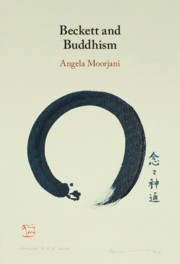Book contents
- Beckett and Buddhism
- Beckett and Buddhism
- Copyright page
- Dedication
- Contents
- Figures
- Acknowledgments
- Abbreviations of Editions Used
- Introduction
- Chapter 1 Schopenhauer’s Buddhism Revisited: Recent Archival Evidence
- Chapter 2 East–West Dialogue via Schopenhauer
- Chapter 3 Buddhist and Mystic Threads in the Early Fiction
- Chapter 4 Beckett’s Paradoxical Logic through Buddhist and Western Lenses
- Chapter 5 The Coincidence of Contraries and Noh Drama
- Chapter 6 The No-Self Staged and Voices from Elsewhere
- Chapter 7 Rebirth and the Buddhist Unborn in the Fiction and Drama
- Chapter 8 Dreaming ‘all away’ in the Final Texts
- References
- Index
Chapter 6 - The No-Self Staged and Voices from Elsewhere
Published online by Cambridge University Press: 08 July 2021
- Beckett and Buddhism
- Beckett and Buddhism
- Copyright page
- Dedication
- Contents
- Figures
- Acknowledgments
- Abbreviations of Editions Used
- Introduction
- Chapter 1 Schopenhauer’s Buddhism Revisited: Recent Archival Evidence
- Chapter 2 East–West Dialogue via Schopenhauer
- Chapter 3 Buddhist and Mystic Threads in the Early Fiction
- Chapter 4 Beckett’s Paradoxical Logic through Buddhist and Western Lenses
- Chapter 5 The Coincidence of Contraries and Noh Drama
- Chapter 6 The No-Self Staged and Voices from Elsewhere
- Chapter 7 Rebirth and the Buddhist Unborn in the Fiction and Drama
- Chapter 8 Dreaming ‘all away’ in the Final Texts
- References
- Index
Summary
In Chapter 6, the parallels with the Buddhist no-self and dream noh’s purgatorial telling of traumatic life stories are pursued in an in-depth analysis of Beckett’s 1972 play Not I. Analyzed is the startling dramatic situation of a spotlit Mouth, spoken through by a ghostly inner voice telling her tale of woe and a second voice correcting her story. The inner voice is linked to earlier scenes of the dispossession of Beckett’s narrators by voices whose dissociative nature is investigated in light of the findings by cognitive scientists that counter claims identifying such voices as ‘schizoid’. The second interfering voice is tied to the social scripts that serve to ventriloquize subjects and authors, leading to postmodern theories of their eclipse that resonate with the Buddhist no-self doctrine. Finally, in the last part of the chapter, the discussion of two of Beckett’s late plays situated in the liminal space between life and death – That Time and Ohio Impromptu – concentrates on the emptying out of memories leading to resignation and the solace of going into timelessness and mindlessness resonating with Buddhist śūnyatā (emptiness) and Zen ‘no-mind’.
Keywords
- Type
- Chapter
- Information
- Beckett and Buddhism , pp. 139 - 160Publisher: Cambridge University PressPrint publication year: 2021

